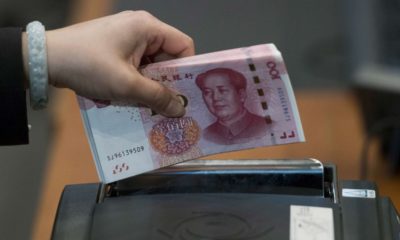- Alibaba Posts Strong Sales Growth Amid SEC Accounting Probe
Alibaba recorded better than expected profits and revenues in its third quarter as the Chinese ecommerce group played down concerns about China’s flagging economy and an ongoing investigation, ahead of the annual Singles Day online shopping spree.
The company said that preparations for Singles Day on November 11, the world’s largest online shopping day, have not been affected by an investigation into its accounting practices by the US Securities and Exchange Commission disclosed in May.
Among its questions, the SEC has asked about the large unaudited numbers Alibaba publishes on sales on Singles Day, which analysts took to mean the measure it uses for total sales across its platforms, gross merchandise value.
Alibaba did not report gross merchandise value in the second quarter for the first time, but during a conference call with analysts on Wednesday, Daniel Zhang, chief executive, said that “GMV so far looks good and growth is on track”.
Joe Tsai, Alibaba executive vice-chairman, also told analysts that there was “no factual basis” to a story in the New York Post newspaper alleging that a high-level whistleblower was helping the SEC in its investigation. The SEC has said that its investigation did not mean Alibaba had breached any laws.
Shares in the group initially climbed more than 4 per cent in pre-market trading in New York but dropped lower after the market opened.
Alibaba said sales in the quarter to the end of September rose 55 per cent to Rmb34.3bn ($5.1bn) compared with the year before, topping Wall Street estimates of Rmb33.9bn. Earnings per share on an adjusted basis rose to Rmb5.26 from Rmb3.61 a share a year ago, which beat expectations of Rmb4.69.
Alibaba makes its money through selling space to merchants on its marketplaces, in the form of fees and advertising revenues. Alibaba’s revenues growth has continued to be strong, despite an economic slowdown across China, mainly from a 47 per cent increase in online marketing services revenues, the group said.
In the period Alibaba reported 439m annual active buyers, a rise of 14 per cent compared with last year.
“We operate a superior marketplace,” said Mr Tsai, adding that Alibaba has fewer limits than its competitors on the amount of advertising load that consumers will accept on an ecommerce website.
“There is no church and state when it comes to content and ads, because they come to the site with very high commercial intent,” he said.
He also cited technological advances in using data to increase click-through rates.
“Our ability to personalise every single user interface, so every person coming to the platform can see different products, and different recommendations; that drastically increases our ability to generate relevant clicks … and drive volumes,” said Mr Tsai.
Net income dropped to Rmb7.1bn, from Rmb22.7bn, the company said, blaming the fall on a large non-cash revaluation gain last year from its interest in Alibaba Health.
Alibaba said that revenue rose 41 per cent in its core ecommerce business to Rmb28.5bn. Meanwhile, its cloud computing unit notched sales growth of 130 per cent to Rmb1.5bn.
Mr Zhang added: “Beyond the strong performance of our core commerce business, we are pleased with the continued rapid growth of our cloud computing business. We also see huge potential in our newly integrated digital media and entertainment unit.”


 Billionaire Watch3 weeks ago
Billionaire Watch3 weeks ago
 Startups4 weeks ago
Startups4 weeks ago
 News4 weeks ago
News4 weeks ago
 News4 weeks ago
News4 weeks ago
 Bitcoin4 weeks ago
Bitcoin4 weeks ago
 Naira4 weeks ago
Naira4 weeks ago
 Forex3 weeks ago
Forex3 weeks ago
 Treasury Bills4 weeks ago
Treasury Bills4 weeks ago






















